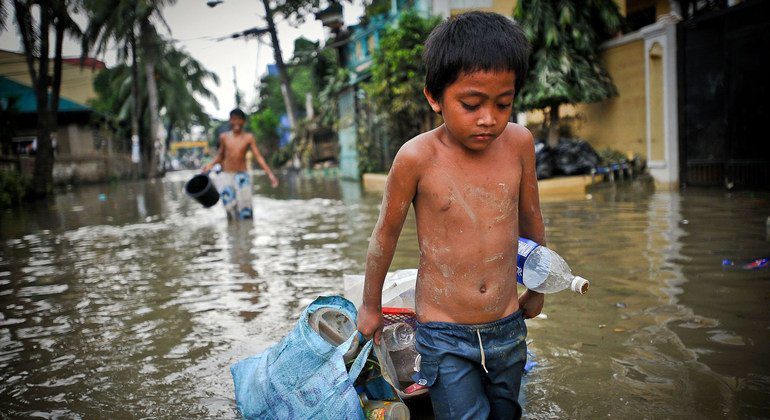Typhoons Kristine and Leon Devastate the Philippines, Amplifying Crises in Water, Sanitation, and Education
Two severe typhoons, Kristine and Leon, have wreaked havoc across the Philippines, displacing hundreds of thousands and leaving millions struggling to access safe water and sanitation facilities. These back-to-back tropical cyclones, the 11th and 12th to strike the country this year, have underscored the escalating challenges posed by climate change and the nation’s vulnerability to natural disasters.
Millions Affected, Critical Needs Unmet
The twin typhoons have left a staggering impact, with at least 4.2 million people affected, including 1.3 million children. Over 300,000 individuals have been displaced, forcing many families into precarious living conditions. In addition to the extensive infrastructure damage, the storms have exposed deep-rooted weaknesses in access to essential services such as clean water and sanitation.
A Growing Water and Sanitation Crisis
The destruction wrought by Kristine and Leon has severely exacerbated existing deficiencies in water and sanitation systems. In some areas, facilities have been completely washed away, forcing residents to resort to open defecation. This has heightened fears of potential disease outbreaks, particularly among children, who are most vulnerable.
“Lifesaving supplies are critical during and after emergencies,” emphasized Oyunsaikhan Dendevnorov, UNICEF’s Representative to the Philippines. “We are collaborating with partners to deliver water, sanitation, and hygiene solutions to ensure families and children are protected from deadly diseases.”
Since October 31, UNICEF and its partners have distributed 2,950 hygiene and water kits to the hardest-hit areas, including Camarines Sur and Albay in the Bicol Region. An additional 350 kits are expected to be delivered in the coming days, in partnership with organizations such as Action Against Hunger and Plan International Pilipinas.
Education in Crisis
The typhoons have also dealt a severe blow to the education sector. According to the Department of Education, at least 500 schools in the Bicol Region alone are in urgent need of assistance. Nationwide, around 20 million children have seen their education disrupted due to the destruction caused by these storms.
“Schools must remain centers for learning and not be used as evacuation sites,” urged Akihiro Fushimi, UNICEF Philippines’ Education Chief. He stressed the importance of maintaining a stable learning environment, even amid such crises.
To support affected students and teachers, UNICEF is collaborating with local authorities to provide educational supplies to 14,594 children and 765 teachers across 25 schools and five Community Development Centers. This initiative aims to restore a sense of normalcy for children and prevent prolonged setbacks in their education.
A Season of Uncertainty
Already one of Southeast Asia’s most disaster-prone nations, the Philippines is grappling with increasingly frequent and intense storms fueled by climate change. Following the destructive impacts of Typhoons Marce and Nika last weekend, regions affected by Kristine and Leon now face the looming threat of a potential new storm forming, which could develop into Tropical Storm Ofel. Recovery efforts are being stretched to their limits.
Despite the mounting challenges, the Philippine government, along with UNICEF and its partners, is intensifying its response. Relief efforts include the provision of critical resources, such as clean water, hygiene supplies, and educational materials, to assist communities in rebuilding their lives.
Speaking on the resilience of the Filipino people, Gustavo González, the UN Resident Coordinator in the Philippines, reflected on the growing risks posed by climate change in a recent blog for UN News. “Exposure to disasters and vulnerability to climate change have compelled Filipinos to cultivate a unique sense of resilience. The ‘saving lives’ spirit is deeply embedded within local communities,” he wrote.
As González pointed out, the shared optimism among Filipinos shines through even in the face of adversity. “As long as there is life, there is hope,” he concluded—an enduring mantra for a nation weathering yet another storm season.














Leave a Reply